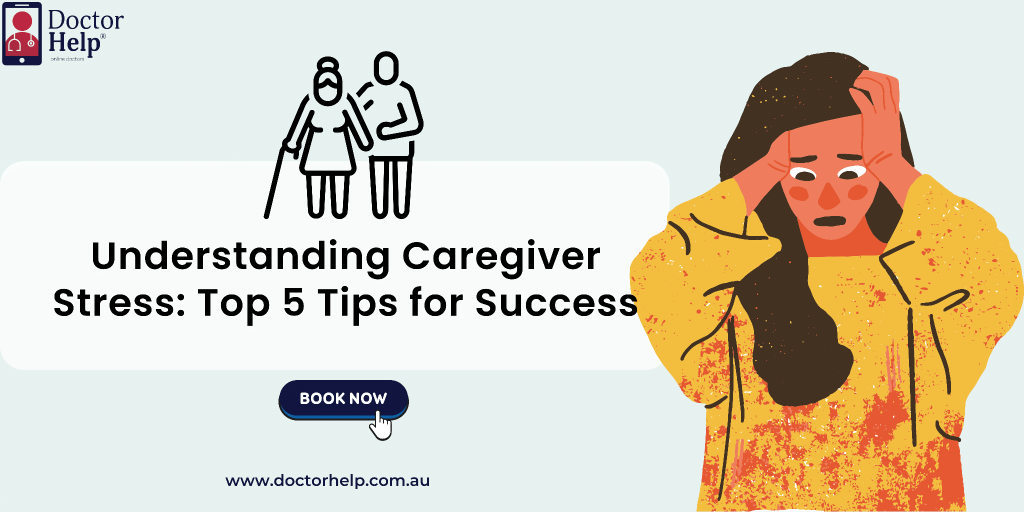Table of Contents
One of the most neglected topics is caregiver stress, which is usually neglected until they reach a breaking point. However, it’s prevalent for a caregiver to put aside their health and care needs for those they are taking care of.
Many challenges come with the role of caregiver. Most of the caregivers are taking care of their family or friends providing informal and unpaid support to their loved ones. These people have a support network in place which ensures that they get attention and rest while they deliver support and care to others.
This is the reason why caregiver stress along with burnout is quite common. Burnout occurs when caregivers don’t get any support that they need, physically, emotionally and financially.
What is the role of a caregiver?
Caregivers provide huge support in taking care of many old-age Australians, on a day-to-day basis. Where the formal support is there either via government programs or privately, a caregiver ensures that recipient care needs are met by working hand in hand.
Caregivers can take over any responsibilities including assisting their loved ones with showering feeding, lifting, or transportation, medication management, as well as emotional and social support. These tasks depend on the recipient’s regular needs, health, and other support requirements.
As per the ABS, Australian Bureau of Statistics 1 in 10 Australians are informal unpaid caregivers who provide a minimum of 20 hours of care weekly. Keeping this in mind caregiver stress might end up in low well-being and burnout!
Signs of Caregiver Stress And Burnout
There are many high points as a carer but there are tough times as well. Sometimes those tough times overcome the good ones. This is the time when caregiver stress begins and it’s a call for help or break.
Some of the signs of caregiver stress are the following:
- Experiencing overwhelming emotions or ongoing pressure: Frequently anxiety, stress, or feelings of being overwhelmed can strongly indicate caregiver stress and the need for a break. Prolonged stress may lead to various physical and mental health concerns.
- Feeling exhausted even after resting: If you find yourself consistently fatigued or low on energy despite getting adequate sleep, it could be a result of the continuous demands of caregiving.
- Frequently falling ill: Most of the time chronic stress associated with caregiving can weaken the immune system, making you more susceptible to illnesses.
- Becoming easily irritated or angry: There is a noticeable increase in irritability or frustration, especially towards the person you are caring for, which is a sign that you might be reaching your emotional limit.
- Experiencing sleep or appetite disturbances: Experiencing the changes in sleeping patterns or eating habits, particularly if accompanied by weight fluctuations, can be indicative of stress and burnout.
- Feeling hopeless or experiencing depressive symptoms: Persistent feelings of hopelessness or thoughts about death or suicide are critical signs of caregiver burnout that necessitate immediate professional help. Reach out to the lifeline in Australia: 13 11 14 for urgent care in cases of severe mental distress
- Ignoring your own needs: If you find yourself neglecting your health or personal care because you are too occupied or indifferent, it is a clear indication that you are overextended and in need of a break.
What are the risk factors for caregiver stress?
The risk factors vary from person to person as per the responsibilities and the ability to take stress:
- Health changes
- Emotional damage
- Depression
- Financial issues
- External stressors impacting work and family life.
5 Tips To Manage Caregiver Stress
There are however resources available for caregivers to offer them much-needed support in their role. Including tips for managing caregiver stress so that you can prevent burnout.
Prioritise time for yourself
Take out some me time for activities which help reduce the stress levels, including exercise, meditation and being close to nature. If this seems overwhelming then try to take a break for 10 minutes a day, these small breaks have great positive impacts.
Communicate
Try to communicate with the support group or your partner. Always make sure your friends and family know that you are having caregivers stress so that they can help reduce it by sharing some responsibilities.
Prioritise time together
Find someone to fill in while you have some time with your partner and family. Go on hiking or stay at home cook and have dinner together. If one of your family members is the one you are taking care of this will also help them to socialize with other people as we as the environment will be less stressed.
It doesn’t have to be perfect
One thing needs to be understood, that caring for others is not perfect. This is not a planned moment when a person is not able to take care of themselves and needs you. So you also learn that time and support of your partner, family and friends matters a lot.
Seek Professional Help
Speaking to a professional will also help you get over your caregiver’s stress. If you experience severe symptoms such as shortness of breath or extreme headache, these could be signs of a more serious condition. Call 000 immediately for emergency medical assistance.
By taking care of your health, you are favouring your dependants as well. Taking time to consider these tips and how you can put self-care into your routine is a great step to begin with.










